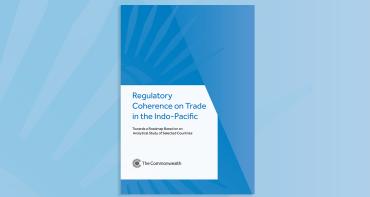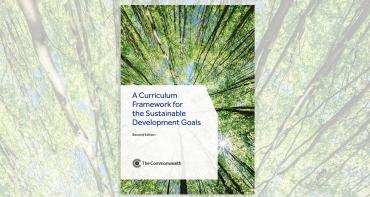A blog by Dr Reginald Darius, Director of Economic Policy at the Commonwealth Secretariat

A blog by Dr Reginald Darius, director of economic policy at the Commonwealth Secretariat
The year 2016 has seen a number of global events which have impacted our Commonwealth member countries to varying degrees. Dealing with the effects of natural disasters and external economic shocks remains a core issue for the majority of countries.
The Commonwealth has been and will continue to help countries to mitigate the economic and social impact of these external events. The Commonwealth provides assistance to member countries through a range of initiatives including innovative means of securing development finance, improving debt sustainability, supporting resilience-building and financing climate action.
Member states have highly valued the Commonwealth for being a vital platform from which they can be heard when decisions that will affect them are made.
Supporting small and vulnerable states
In 2016, the Commonwealth made considerable progress in advancing international awareness of the economic, social, environmental and governance challenges affecting small states.
At the Fourth Global Biennial Conference on Small States in Seychelles in May, we brought together small states representatives to brainstorm on current and emerging issues, share best practices and experiences, and agree on practical policy options for strengthening resilience.
In parallel, we have been working with countries to assess national governance challenges and examine the effectiveness of current regional development strategies in achieving their developmental goals. These initiatives help countries and regions to best position themselves to achieve sustainable development.
In the near future, a comprehensive study will be undertaken to explore the use of vulnerability as a criterion for accessing concessional finance and overseas development assistance.
Financing climate action
Climate change is reversing progress on poverty alleviation, economic growth and stability across the world. Although climate finance is being made available to developing countries through a number of international initiatives, these countries often do not have the capacity to access these funds.
The Commonwealth Climate Finance Access Hub was designed to unlock billions of dollars in pledged funds for adaptation and mitigation in developing countries. It is a great example of how we have been able to work with member states and development partners to identify a gap and a clear niche where the Commonwealth can add value.
Since its launch, 14 member countries have requested support with the first set of technical advisers to be deployed. Our key milestones this year included getting the central hub up and running, the recruitment of the general manager, the official signing of the hosting agreement between Mauritius and the Commonwealth, and the inaugural meeting of the steering committee.
In 2017, to meet members’ increasing demand, we will be focussing on mobilising resources to expand the programme and engaging with regional institutions to ensure full implementation.
Building fiscal resilience
As part of the Commonwealth’s broader work on addressing the vulnerability and increasing the resilience of small states, we promote greater debt sustainability, particularly in small states. Eleven Commonwealth small state members hold debt-to-GDP ratios above the IMF-World Bank debt sustainability benchmark of 60 percent, while all remain incredibly exposed to the effects of climate change.
Endorsed by UN Secretary-General Ban Ki-moon earlier in 2016, our innovative Debt Swap for Climate Change Adaptation and Mitigation Mechanism will give countries the option to exchanging debt for a commitment to financing climate resilient projects. We have been working with the international community to implement this solution which addresses the dual challenge of inadequate climate finance and high debt burdens.
Presenting alongside the Bank of England, Bank of France and the Government of Gabon at the Paris Club Forum, we emphasised the importance of developing new instruments to improve debt sustainability in the face of climate change, such as Countercyclical Financial Instruments, which allow countries hit by a natural disaster a repayment holiday on government loans and bonds while they rebuild.
We have also been addressing the issue of de-risking, which is particularly detrimental to small states and vulnerable economies. This has been restricting legitimate individuals, businesses, banks and even governments’ access to the global financial system. It represents a serious threat to a number of our member countries.
Disconnecting from Global Finance, our report published earlier this year, offered policy recommendations and identified a number of innovative and practical solutions at the national, regional and international level. A follow-up public conversation held in London with regulators, money transfer businesses, financial institutions, affected member countries and civil society highlighted the need for timely and collective efforts in order to tackle the issue.
We are continuing to engage with our members on their experiences and have also been leveraging our relationships with the regulator, Financial Action Task Force, Financial Stability Board, the G20 Development Working Group and our developed country membership to influence the international agenda.
Looking ahead
As the year draws to a close, there is much for us to reflect on at the Commonwealth. How we can continue to help developing member countries, particularly small and vulnerable states, overcome their various economic challenges will remain a critical priority – especially with a view to delivering the internationally agreed sustainable development goals and building resilience.
We believe the best way to achieve this is by advocating for participation and a voice in international platforms and through the use of practical innovative solutions. In addition, as part of our international tax and regulation programme, we will be working with many small state members that host international financial centres to engage with an international agenda that includes two blacklisting exercises. We will also be advocating to ensure these processes are fair and balanced and do not single out small and voiceless states.
Looking much further ahead, the hosting of CHOGM 2018 in the UK will give the Commonwealth a unique opportunity to raise the profile of pressing economic issues on a world stage and emphasise the need for an inclusive and level playing field in global decision-making processes.



